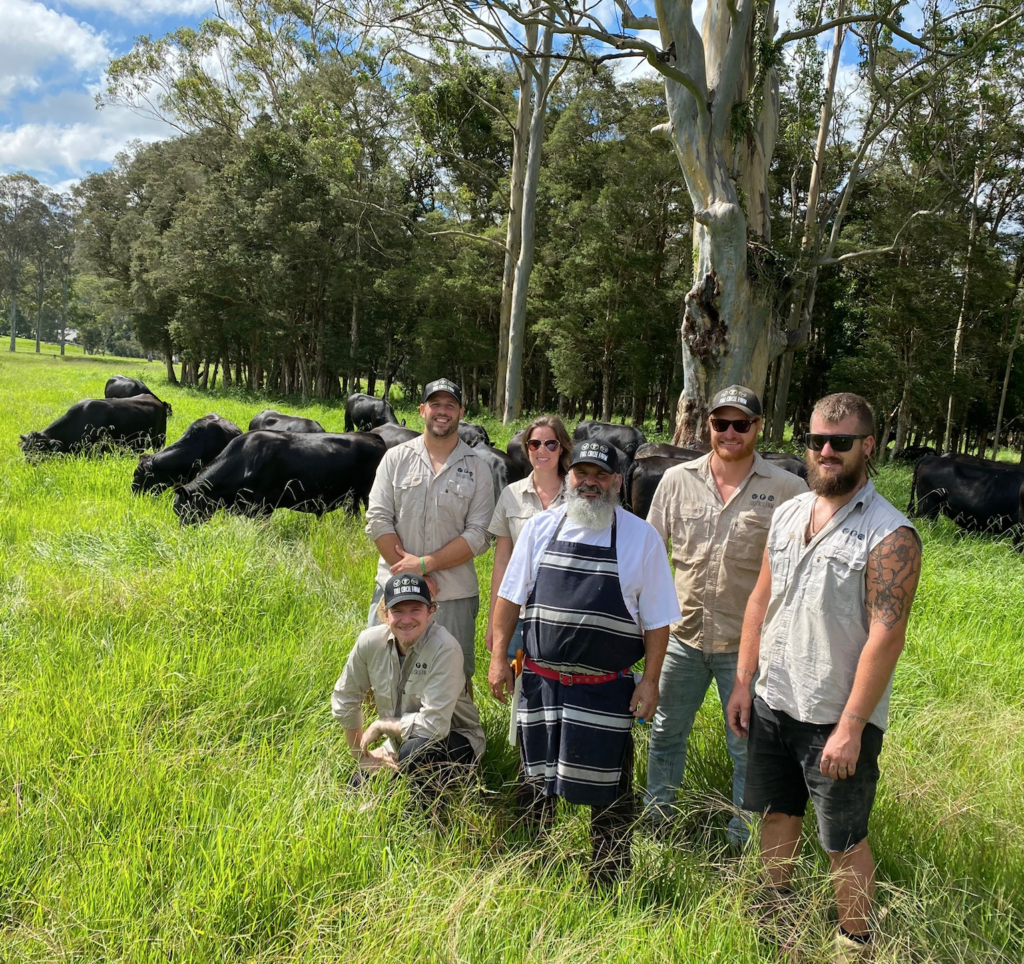We’re midway through a series exploring the countless benefits associated with sourcing good quality meat and animal products. Last week we touched on how misleading labels like ‘free range’ and ‘organic’ can be and highlighted a more reliable way of discerning quality: shopping local and asking the producer directly, about their agricultural practices.

This week we’re chatting to local farmer Shannon Kelly from Full Circle Farm about a practice that is possibly the single biggest determining factor of meat quality – something colloquially referred to as rotational grazing.
Weird farming at Full Circle Farm
Its ok to be weird. It’s even ok to be a weird farmer. At Full Circle Farm; we like to do things differently to standard, industrial agricultural practices. We’re weird and proud of it!
We move our herd of 80 cattle almost every day. Sometimes up to 4 times a day! Madness to some, but hear me out. This practice is called ‘Adaptive Grazing Management’. This approach to grazing brings a plethora of benefits to the land, the animal and the consumer. So much so, we do it with all of our animals. 1,000 egg layer chickens, 1000 meat chickens, 50 pigs and 200 ducks. All of them move.
To understand why this way of farming is so exciting, we first need to understand what needs improving with standard grazing practices. Typically, herds are ‘set-stocked’. Cattle, for example, are given a large paddock, continuously grazing the pasture with little or no periods of rest.
The problem with this is that cattle are like children: they head straight for the ice-cream! The herd eat the best, sweetest grass first, leaving the lower successional species (their veggies) to go to seed.
When they stay in that same paddock, the real issue is created when that ‘ice-cream’ plant starts to recover and grow new leaves. Since those cheeky cattle love their ice-cream about as much as I like a generous bowl of salted caramel ice-cream; they go back to those plants and over-graze them when they are in their most fragile phase. This sets the plant back, sometimes wiping them out completely. Instead of the paddock improving, the less palatable plants proliferate and the quality of pasture and its capacity to nourish the animal, declines over time.

What is Adaptive Grazing Management?
Adaptive Grazing Management is the process of moving animals continually through paddocks with a focus (and sometimes obsession!) on pasture recovery. Good graziers will slow down and speed up their herds to accommodate the continual variables mother nature throws at them. This is what we do at Full Circle Farm.
After our herd have grazed the pasture, they are not allowed to come back to that paddock for 30-150 days, depending on the season, rainfall and other variables. The herd eat a more balanced diet of higher and lower quality pastures. Our pasture can then recover, allowing all plants to fully recover before their next grazing period. The main result is pastures, soil and land that maintains its health – and even regenerates.
Some may look at this approach and conclude that it’s too much work. Not so! Moving cattle each day is such a joyous activity. They come like big puppy dogs when you call them, making the cattle prod and cowboy antics null and void.
This way of grazing is nothing new. In fact; it’s a blatant plagiarism of a naturally occurring, beautiful relationship between the ruminant animal and grasslands. Think of the wildebeest on the Serengeti. Huge herds of ruminant animals mobbed together for fear of predators, mowing grasslands flat and constantly moving onto new ground. Adaptative Grazing Management seeks only to copy the genius of nature and its patterns.
For anyone playing at home; no, we don’t have a bunch of lions waiting in the bushes keeping our cattle mobbed together. It wouldn’t be very kid-friendly! We use single strand electric fence lines that we can construct and deconstruct in minutes. Combined with a portable water trough, we have the ability to keep our cattle mobbed together and match the topsoil generating process that’s been around for eons.
Regenerating soil and pasture health
There are numerous other benefits to this approach of land and animal management. When perennial pastures are pruned and allowed to recover properly, they pulse carbon from the atmosphere down into the soil where it belongs, improving our most valuable resource – our soil – over and over again.
There are farmers turning deserts back into grasslands, cleaning up our air, reviving communities, simply using the humble, underrated, over-vilified cow. Regarding environmental health as a whole, the saying ‘it’s not the cow it’s the how’ is incredibly fitting.

The secret to drug-free cattle
When our herd of cattle constantly move onto new ground, they are moving away from ‘yesterday’s toilet’. Parasite cycles work by larvae hatching out of dung, crawling up a leaf to be ingested again by the animal. When the herd has moved onto fresh pasture, the parasite has no host to ingest them and they die off – breaking the cycle. This is why our animals don’t do drugs! When parasite cycles are shut down, we don’t need to pump our animals with pharmaceuticals to keep them healthy. This equals cleaner meat, with no nasties.
This way of managing ruminant animals is normal and natural. It’s grounded. When we put the majestic cow into feedlots, we create a food system that is completely abnormal.
We need thousands of square kilometres of land to grow grain to feed to an animal that is not even designed to eat it. All for the lofty industrial goals of bigger, fatter, faster, cheaper. A food system like this hurts our land, the animal and ultimately the consumer’s health. Why don’t we as a society get behind food production systems that are the opposite to this? Consumers have had and will always have the power to drive change.
Adaptive Grazing Management can sequester carbon, regenerate soil and improve pasture. What a story. What hope for our nation and beyond!
The humble cow, the caring farmer and the conscious consumer: working together in an utterly fantastic land-healing endeavour.
So, the next time you buy beef or any other animal protein, ask ‘how often are they moved’ and ‘did they eat their ice-cream AND veggies’!
Full Circle Farm offer their delicious, quality products to the public via convenient online shopping with home delivery, local markets and ‘food clubs’ all over the coast. To find out more, head to fullcirclefarm.com.au or follow their story on Facebook or Instagram.
Georgia is a clinically trained nutritionist, wholefoods chef, columnist and mum. She’s been featured in Body & Soul and had TV appearances on ABC Breakfast and Studio 10 for her unique approach to food and health. She’s known for reinventing traditional foods for the modern kitchen and was instrumental in a radical new approach to sports nutrition with a program for the NRL Parramatta Eels, kickstarting their ascent on the ladder in recent years. Find out more at stirringchange.com.



